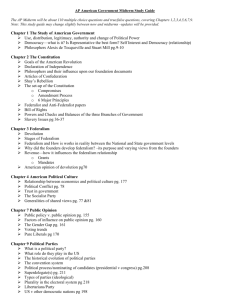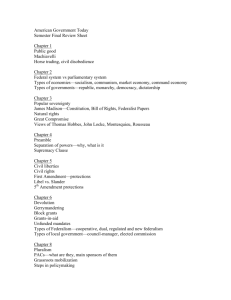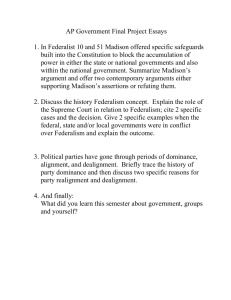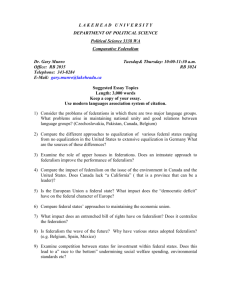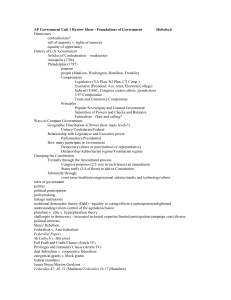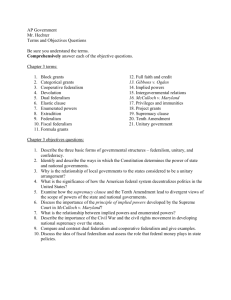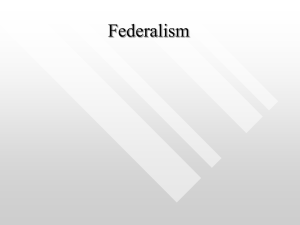Study Guide Chapter 3
advertisement
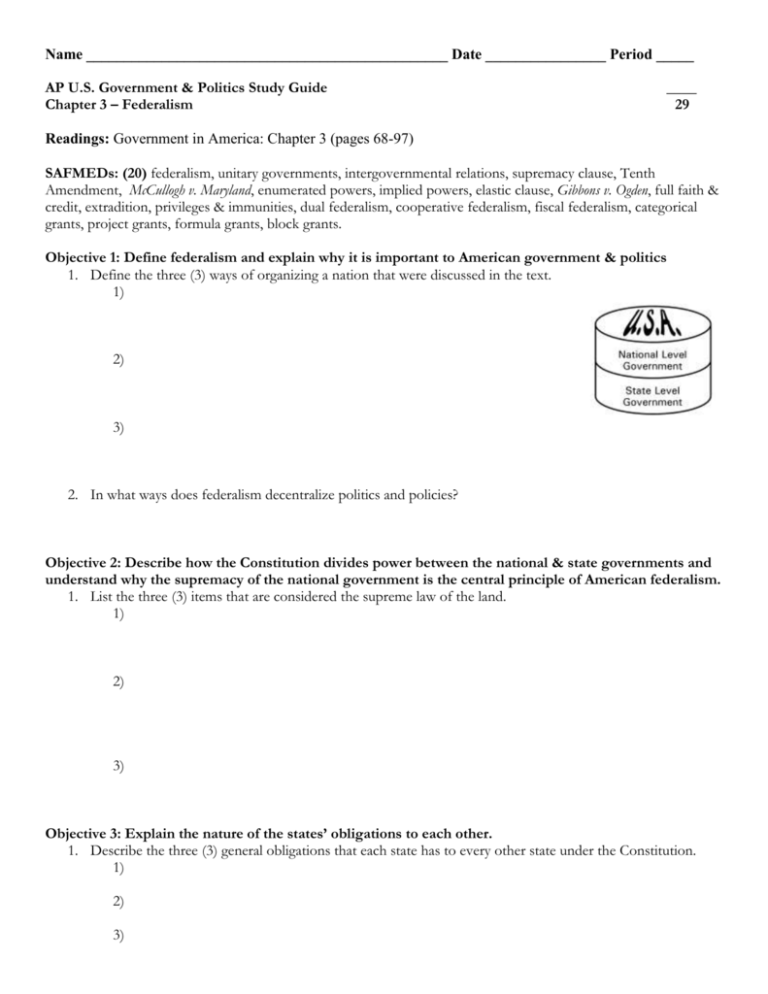
Name ________________________________________________ Date ________________ Period _____ AP U.S. Government & Politics Study Guide Chapter 3 – Federalism ____ 29 Readings: Government in America: Chapter 3 (pages 68-97) SAFMEDs: (20) federalism, unitary governments, intergovernmental relations, supremacy clause, Tenth Amendment, McCullogh v. Maryland, enumerated powers, implied powers, elastic clause, Gibbons v. Ogden, full faith & credit, extradition, privileges & immunities, dual federalism, cooperative federalism, fiscal federalism, categorical grants, project grants, formula grants, block grants. Objective 1: Define federalism and explain why it is important to American government & politics 1. Define the three (3) ways of organizing a nation that were discussed in the text. 1) 2) 3) 2. In what ways does federalism decentralize politics and policies? Objective 2: Describe how the Constitution divides power between the national & state governments and understand why the supremacy of the national government is the central principle of American federalism. 1. List the three (3) items that are considered the supreme law of the land. 1) 2) 3) Objective 3: Explain the nature of the states’ obligations to each other. 1. Describe the three (3) general obligations that each state has to every other state under the Constitution. 1) 2) 3) Objective 4: Explain how federalism in the U.S. has shifted from dual to cooperative federalism. 1. How is dual federalism analogous to a layer cake and cooperative federalism analogous to a marble cake? 2. Explain the three (3) general standard operating procedures of cooperative federalism. 1) 2) 3) Objective 5: Describe the nature of fiscal federalism and how states and cities compete for federal grants and aid. 1. What is meant by “cross-over sanctions” and “cross-cutting requirements”? Cross-over Sanctions: Cross-cutting Sanctions: 2. Explain the two (2) types of categorical grant. 1) 2) 3. For what reasons might a state or locality not want to receive federal aid? Give an example. Objective 6: Explain the relationship between federalism and democracy, and how federalism contributes to and detracts from democracy. 1. List four (4) advantages of federalism for democracy. 1) 2) 3) 4) 2. List four (4) disadvantages of federalism for democracy. 1) 2) 3) 4) Objective 7: Understand how federalism has contributed to the scope of the national government. 1. How did industrialization increase the role of the national government? 2. Why don’t the states handle more issues? AP United States Government & Politics Free Response Questions – Chapter 3: Federalism Mr. Villanueva Choose three (3) of the following eight (8) Free Response Questions and answer them to the best of your ability. These questions are meant to help you prepare for the written portion of the AP Govt. Exam. Please indicate which FRQ you are responding to by including its number. Also, you must include at least one (1) SAFMED in each response. Your SAFMED must be in bold and may not be repeated. Your response must be typed, 12font. Tip: Make sure you answer the question in its entirety (5 points each). 1. Define federalism. How is federalism different from unitary governments and confederations? Why is federalism important to understanding American government? 2. What does the Constitution have to say about national versus state powers? How was the supremacy of the national government established in the American federal system? 3. Explain the obligations that states have to each other. Give examples to illustrate your answer. 4. Why does cooperative federalism, as compared to dual federalism, best describe the American federal system today? Why is fiscal federalism important to intergovernmental relations? 5. Compare and contrast the different types of federal aid and grants given to states and cities. What is the nature of the competition for federal grants? Under what conditions might states not want to receive federal aid? 6. What are the advantages and disadvantages of federalism for democracy? Give examples to illustrate your answer. 7. How and why has federalism contributed to the growth of the national government? 8. Evaluate federalism as a way of organizing government in America. Could the American system have been a unitary system?

